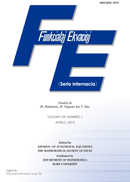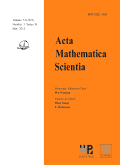
Journal of Inequalities and Special Functions
Scope & Guideline
Connecting Ideas in Inequalities and Special Functions
Introduction
Aims and Scopes
- Inequalities in Mathematical Analysis:
The journal emphasizes the study and development of various types of inequalities, including classical inequalities, functional inequalities, and inequalities related to special functions. - Special Functions and Their Applications:
Research on special functions such as Bessel functions, hypergeometric functions, and polynomials, exploring their properties, applications, and interrelations. - Functional Analysis and Operator Theory:
Papers often delve into inequalities and convergence properties in the context of functional analysis, including studies related to operators in different functional spaces. - Numerical Methods and Approximations:
The journal includes contributions that develop numerical methods for solving inequalities and equations involving special functions, enhancing computational techniques. - Mathematical Modeling and Applications:
Research that applies inequalities and special functions to model real-world problems across various domains, including physics, engineering, and finance.
Trending and Emerging
- Generalized Inequalities:
There is a growing interest in generalized forms of classical inequalities, with researchers exploring broader conditions and applications, enhancing the versatility of inequality theory. - Fractional Calculus and Differential Inequalities:
Recent publications have highlighted an increasing focus on fractional calculus, particularly in relation to inequalities, showcasing its relevance in modern mathematical analysis. - Inequalities in Nonlinear Analysis:
An emerging trend in the journal is the application of inequalities to nonlinear analysis, particularly in relation to differential equations, reflecting the complexity of modern mathematical challenges. - Asymptotic Analysis and Special Numbers:
A notable increase in research related to asymptotic expressions and sequences involving special numbers indicates a shift towards more analytical approaches in mathematical inequalities.
Declining or Waning
- Fuzzy Sets and Soft Set Theory:
While fuzzy and soft set theories were once prominent in the journal, recent publications indicate a reduced emphasis on these topics, possibly reflecting a broader trend in mathematical research. - Traditional Probability Inequalities:
The scope of classical probability inequalities appears to be waning, as newer methodologies and applications in probability theory have emerged, leading to a decreased focus on traditional approaches. - Historical Inequalities:
Research centered on historical perspectives of inequalities has diminished, as the journal seems to be prioritizing novel and contemporary advancements over historical analyses.
Similar Journals

Constructive Mathematical Analysis
Empowering Innovative Research in Mathematical AnalysisConstructive Mathematical Analysis is a distinguished open-access journal dedicated to advancing the field of mathematical analysis, specifically through constructive methods. Published by Tuncer ACAR and affiliated with Selcuk University in Turkey, this journal has been making a significant impact in the academic community since its inception in 2018. With an emerging presence in Scopus, it has earned a Q2 ranking in key categories including Analysis, Applied Mathematics, and Numerical Analysis for 2023, reflecting its commitment to high-quality research contributions. By providing a platform for innovative research and interdisciplinary approaches, "Constructive Mathematical Analysis" aims to facilitate collaboration among researchers, educators, and students in their pursuit of knowledge in mathematical science. With its open-access model, the journal ensures that research findings are accessible to a global audience, fostering an inclusive academic environment.

Tbilisi Mathematical Journal
Bridging Communities through Cutting-Edge Mathematical Research.Tbilisi Mathematical Journal is a premier publication dedicated to the advancement and dissemination of mathematical research. Published by the TBILISI CENTRE MATH SCI, this journal provides a vital platform for presenting new findings and methodologies in various branches of mathematics. The journal, bearing the ISSN 1875-158X and E-ISSN 1512-0139, emphasizes an open-access model, ensuring that valuable mathematical insights are readily available to a global audience. With a commitment to fostering collaboration and innovation, the Tbilisi Mathematical Journal attracts high-quality submissions that advance both theoretical and applied mathematics, making it an essential resource for researchers, professionals, and students alike. The journal is based at the A Razmadze Mathematical Institute, located in the vibrant city of Tbilisi, Georgia, and seeks to bridge the gap between regional and international mathematical communities. By focusing on rigorous research and comprehensive reviews, it contributes significantly to the mathematical sciences, promoting a deeper understanding of complex concepts and their applications.

PROCEEDINGS OF THE INDIAN ACADEMY OF SCIENCES-MATHEMATICAL SCIENCES
Unveiling the Potential of Mathematics in a Changing WorldPROCEEDINGS OF THE INDIAN ACADEMY OF SCIENCES-MATHEMATICAL SCIENCES is a premier journal published by Springer India, dedicated to advancing the field of mathematics through the dissemination of high-quality research. With its foundation dating back to 1978, the journal serves as a pivotal platform for researchers, professionals, and students alike, fostering a vibrant academic community focused on the latest developments in mathematical sciences. Although currently positioned in the Q3 category for Mathematics (miscellaneous) with a Scopus rank of #340/399, the journal holds immense potential for growth and wider recognition within the academic sphere. It features articles that span various mathematical disciplines, encouraging innovative ideas and methodologies that contribute significantly to the field. The journal's contributions are especially relevant in the context of expanding mathematical applications in science and technology. Though it operates without an Open Access option, the journal remains an invaluable resource for anyone engaged in mathematical research, offering insights that inspire future studies and collaborations.

COLLOQUIUM MATHEMATICUM
Fostering collaboration in the world of mathematics.COLLOQUIUM MATHEMATICUM, published by ARS POLONA-RUCH, serves as an essential platform for the dissemination of innovative research in the field of mathematics. With an ISSN of 0010-1354 and a dedicated E-ISSN of 1730-6302, this journal plays a crucial role in advancing mathematical knowledge and fostering collaboration within the academic community. Although it is categorized in the Q3 quartile for miscellaneous mathematics, its content consistently attracts a diverse readership, reflecting a wide array of mathematical disciplines. Spanning publication years from 2001 to 2009 and resuming from 2011 to the present, *COLLOQUIUM MATHEMATICUM* offers researchers, professionals, and students the unique opportunity to engage with groundbreaking concepts and methodologies. With its home base in Warsaw, Poland, this journal not only contributes to the regional mathematical landscape but also impacts the broader global community. While currently not adopting an open access model, the journal remains committed to quality research, evidenced by its Scopus ranking within the general mathematics category. Engage with *COLLOQUIUM MATHEMATICUM* to be at the forefront of mathematical exploration.

Studia Universitatis Babes-Bolyai Mathematica
Advancing the Frontiers of Mathematical KnowledgeStudia Universitatis Babes-Bolyai Mathematica is a prestigious journal published by UNIV BABES-BOLYAI in Romania, dedicated to advancing the field of mathematics and its diverse applications. With an ISSN of 0252-1938 and E-ISSN 2065-961X, this journal has carved out its niche in the Q3 category of miscellaneous mathematics as of 2023, ranking 315 out of 399 in the Scopus Mathematics General category, reflecting its commitment to quality and relevance in mathematical research. Covering a wide range of mathematical topics, it seeks to foster scholarly dialogue and innovation among researchers, practitioners, and students. Although it operates under a traditional access model, the journal remains a vital resource for the mathematical community, inviting submissions that contribute to theoretical advancements and practical applications. Established in 2016, Studia Universitatis Babes-Bolyai Mathematica is poised to remain a central platform for groundbreaking research through 2024 and beyond, making it an essential addition to the libraries of those engaged in mathematical study and discourse.

Funkcialaj Ekvacioj-Serio Internacia
Exploring the Depths of Algebra, Analysis, and GeometryFunkcialaj Ekvacioj-Serio Internacia is a distinguished mathematical journal published by the Kobe University Department of Mathematics, Japan. With an ISSN of 0532-8721, it serves as a platform for the dissemination of high-quality research in the fields of Algebra, Analysis, and Geometry and Topology. Since its inception, the journal has made significant contributions to these areas, evidenced by its ranking in the third quartile (Q3) in 2023 across all three categories. Although the journal does not currently offer open access, it remains an essential resource for researchers and students alike, fostering a deeper understanding of complex mathematical concepts and encouraging collaborative advancements in these vital fields. With a commitment to rigorous peer review and scholarly excellence, Funkcialaj Ekvacioj-Serio Internacia is an invaluable asset for professionals looking to stay at the forefront of mathematical research.

POTENTIAL ANALYSIS
Elevating Understanding in Potential TheoryPOTENTIAL ANALYSIS is a prestigious academic journal dedicated to the field of mathematical analysis, published by Springer. With the ISSN 0926-2601 and E-ISSN 1572-929X, this journal serves as a pivotal platform for scholars to disseminate cutting-edge research and advancements in potential theory, providing insights that bridge theoretical mathematics and applied analysis. Since its inception in 1992, POTENTIAL ANALYSIS has consistently maintained a high impact factor, boasting a Q1 rating in the 2023 category of Analysis, signifying its influence and reputation among its peers. It ranks 76 out of 193 in the Mathematics Analysis category in Scopus, placing it within the 60th percentile, which attests to the journal's commitment to quality and rigorous peer-review processes. While access to its articles is not open, it remains an essential resource for researchers, professionals, and students aiming to expand their understanding of potential theory and its applications in various fields. The journal's ongoing publication until 2024 promises a continual flow of innovative research, underpinning its role as an invaluable asset in the mathematical community.

Jaen Journal on Approximation
Exploring the Frontiers of Approximation TheoryJaen Journal on Approximation (ISSN: 1889-3066; E-ISSN: 1989-7251) is a distinguished academic platform published by UNIV JAEN, ESCUELA UNIV MAGISTERIO SAGRADA FAMILIA, catering to the field of Mathematics with a specialized focus on approximation theory, numerical analysis, and their applications. Established in Spain, this journal has been a critical resource for researchers and practitioners since its inception, with active publication years spanning from 2009 to 2019 and a recent resurgence from 2021 to 2022. Although currently categorized in Q4 among Analysis and Numerical Analysis disciplines, it provides invaluable insights and fosters discussion on topics pertinent to contemporary mathematical research. The journal is accessible without Open Access options, affirming its commitment to preserving the academic integrity of the research it disseminates. As researchers seek to navigate the complexities of numerical methods and approximation strategies, the Jaen Journal on Approximation remains an essential resource, inviting contributions that enhance understanding and innovation in the mathematical sciences.

Publications de l Institut Mathematique-Beograd
Connecting researchers with groundbreaking mathematical ideas.Publications de l Institut Mathematique-Beograd is a distinguished journal in the field of mathematics, published by Publications L Institut Mathematique Matematicki in Serbia. With an ISSN of 0350-1302, it aims to disseminate high-quality research across various domains of mathematics, fostering academic discourse and innovation. Despite its open access status being unspecified, the journal is accessible to a wide audience, supporting an inclusive environment for knowledge sharing. The journal's impact is reflected in its 2023 category quartile ranking of Q3 in Mathematics (Miscellaneous), verifying its contribution to the mathematical community. With a Scopus ranking placing it in the 22nd percentile of general mathematics, it serves as a vital resource for researchers, professionals, and students eager to stay abreast of contemporary mathematical advancements. Since its convergence in 2002, and with ongoing publications continuing through 2024, this journal remains a crucial platform for sharing innovative mathematical ideas and results.

ACTA MATHEMATICA SCIENTIA
Cultivating Excellence in Interdisciplinary ResearchACTA MATHEMATICA SCIENTIA is a reputable academic journal published by Springer, primarily focusing on the interdisciplinary fields of mathematics and physics. With an ISSN of 0252-9602 and an E-ISSN of 1572-9087, the journal has established itself as an influential platform for researchers and professionals seeking to disseminate novel findings in these domains. Based in the Netherlands, the journal holds a commendable Q2 category ranking in both Mathematics and Physics & Astronomy for 2023, reflecting its significance in the academic community. With a focus extending from 1996 to 2024, ACTA MATHEMATICA SCIENTIA serves as a vital resource for scholars, offering insights that bridge theoretical and applied sciences. Published under rigorous peer review, the journal fosters a robust scholarly dialogue and encourages innovative research that challenges existing paradigms. While access is not open, the journal's contributions are of paramount importance for advancing knowledge in the mathematical sciences and their applications in physical contexts.